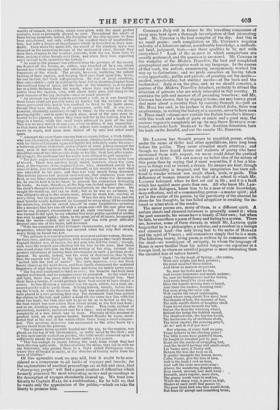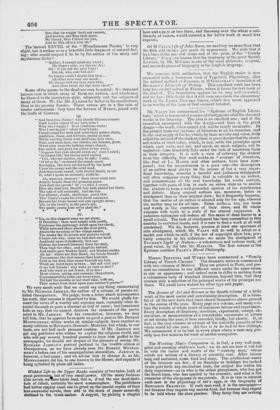Mr. LANDOR has thought proper to republish poems, which, under
the name of Gebir and other appellations, have long been before the public. They never attracted much attention ; and though we have found lovers and students of poetry who have mentioned them with respect, we never could detect the poetical elements of Gebir. We can convey no better idea of the nature of this poem than by saying that it most resembles, if it has a like- ness in things real or unreal, a dream. Its images are faint, though wild ; probability is despised, and the imagination has been suf- fered to wander without one single check, scale, or guide. This deficiency of human interest is the fault of a school to which Mr. LANDOR belonged when he first set out in life ; and it is a fault which has spoiled more poets than one. All who know Mr. LAN- nores able dialogues, know him to he a man of wide knowledge, deep reflection, and of a commanding genius—a master spirit; and yet in the earlier of his poems, by the peculiarity of the channel he chose for his thoughts, he has failed altogether in awaking the in- terest or admiration of the reader.
The minor poems are, many of them, in a different spirit. A certain chaste and classical terseness is generally aimed at : when the poet succeeds, his verses have a beauty onheir own ; but when he fails, he sacrifices a poem of fancy and feeling to a system. There are, however, some of these stanzas, in which Mr. LANDOR quite forgets that he is a philosopher, a scholar, and a resident in a foreign and classical land—the only living heir to the metre of HoRAca and the spirit of VIRGIL ; and remembers simply that he is a man. The following hearty, living poem, is written by no commoner with the dead—no worshipper of antiquity, to whom the language of Rome is more familiar than his native tongue—no sojourner in a foreign land, to whom an unrolled papyrus is more interesting than the unveiled face of nature herself.
" Hark ! 'tis the laugh of Spring .. she comes, With airy sylphs and fiery gnomes ; On cruel mischief these intent, And those as anxious to prevent.
So, now for frolic and for fun, And swains foresworn and maids undone; So, now for bridegrooms and for brides, And rivals hang'd by river-sides.
Here the hoarse-wooing dove is heard, And there the cuckoo, taunting bird !
But soon along the osier vale Will warble the sweet nightingale, Amid whose song chaste Eve must hear Thethreats of love, the screams of fear, The milk-maid's shriek of laughter shrill From hovel close beneath the hill, Before the door the whirring wheel, Behind the hedge the ticklish squeal, The shepherd rude, the hoyden wroth, The boisterous rip of stubborn cloth, The brisk repulse, the pressing pray'r, Alt do! and do it if you dare !
But whence, at every field we pass, Those hollows in the starting grass?
The little Loves have gambol'd there, Or fought or wrestled pair by pair. Moist are the marks of struggling feet, And the bruis'd herbage still smells sweet.
Let Nancy now, if Nancy will, Return the kiss she took so ill.
If gentler thoughts thy bosom move, Come Nancy, give the kiss of love.
Soft is the bank I rest on here, And soft the river murmurs near : Above, the wandering dimples play, Run round, unwind, and melt away : Beneath, more regular, more slow, The grassy weeds wave to and fro, While the sharp reed, it peers so high, Shakes at each swell that passes by. The poor tired bird who fain would drink,
But fears th' abrupt and crumbling brink,
Sees that its weight 'twill not sustain, %. And hovers, and flies back again.
My Nancy, thus I thirst for you,
And he flies off as I may do."
The 'morsel XXVIII. of the " Miscellaneous Poems," is very slight, but it strikes us as a beautiful little fragment of natural feel, ing : who would suspect it to be by the author of the misty and mysterious Gebir?
" Mother, I cannot mind my wheel ; My fingers ache, my lips are dry : Oh ! if you felt the pain I feel !
But oh, who ever felt as I !
No longer could I doubt him true ..
All other men may use deceit ; He always said my eyes were blue, And often swore my lips were sweet."
Some of the poems to the dead are very beautiful: tki stern and
laconic tone in which many of them are written, and which may be likened to the inscription style, admirably suit the subjects of many. of them. We like Mr. LANnort far better in his recollections than in his passing fancies. These verses are in a fine vein of tender enthusiasm : they have the fervour of BYRON, joined with the truth of COWPER.
HI.
"And thou too, Nancy ! why should Heaven remove Each tender object of my early love ?
Why was I happy ? 0 ye conscious rocks ! Was I not happy ? when Tone's locks Claspt round her neck and mine their golden chain, Ambition, fame, and fortune, smiled in vain. While warring winds with deaf'ning fury blew, Near, and more near, our cheeks, our bosoms, grew. Wave after wave the lashing ocean chased, She smiled, and prest me closer to her waist.
Suppose this cave should crush us,' once I cried; It cannot fall,' the loving maid replied. You, who are shorter, may be safe,' I said; 0 let us fly,' exclamed the simple maid. Springing, she drew me forward by the hand Upon the sunny and the solid sand, And then lookt round, with fearful doubt, to see If, what I spoke 'so seriously, could be.
Ah, memory, memory ! thou alone canst save Angelic beauty from the grasping grave. And shall she perish ? by yon stars I swear, Here she shall live, though fate bath placed there.
The sigh of soft surrender, and the kiss For absence, doubt, obedience, merit this.
Tho' Nancy's name for ever dwell unknown Beyond her briar-bound sod and upright stone; Yet, in the lover's, in the poet's eye,
The gentle youn., Ione ne'er shall die." IF • E a- i •
"Yes,. in this chancel once we sat alone, 0 Dorothea ! thou wert bright with youth, Freshness like morning's dwelt upon thy cheek, While here and there above the level pews, AboVe the housings of the village dames,
The musky fan. its groves and zephyrs waved.
I know not why, since we had each our book And lookt upon it stedfastly, first one Outran the learned labourer from the desk, Then tript the other, and limpt far behind, And smiles gave blushes birth; and blushes smiles. Ah me ! where are they flown, my lovely friend I Two seasons like that season thou hast lain Cold as the dark-blue stone beneath my feet, While my heart beats as then .. but not with joy !
O my lost friends ! why were ye once so dear And why were ye not fewer, 0 ye few!
Must winter, spring, and summer, thus return, Commemorating some one torne away, Till half the months at last shall take, with me, Their names from those upon your scatter'd graves I"
We very much wish that we could say any thing encouraging to Mr. RICHARD JARMAN, the author of a volume of poems en- titled Omnipotence. We judge, from a letter which accompanies his work, that success is important to him. We would gladly for- ward the views of a worthy and aspiring man, especially when di- rected through so pure a channel as that of verse ; but conscience bids us say, that we cannot discover the elements of the poetic mind in Mr. JARMAN. For his consolation, however, we may tell him, that he appears to us quite as 'good a poet as Mr. ROBERT MONTGOMERY, whose works on similar subjects have reached as many editions as BUcHAN's Domestic Medicine, but which, to our taste, are not half such pleasant reading. If -Mr. JARMAN can get any publisher who wishes to exploit the religious world, and who will pay several hundred pounds to have him 'puffed in the newspapers, we should not despair of the pleasure of seeing Mr. RICHARD JARMAN S portrait prefixed to the twelfth edition of Omnipotence, as we have already seen Mr. ROBERT MONTGO- MERY'S before one of his sesquipedalian absurdities. JARMAN is, however, a bad name ; and we advise him to change it, as Mr. MONTGOMERY did his, to one known to the Muses, and capable of being syllabled by pious old ladies.



























 Previous page
Previous page